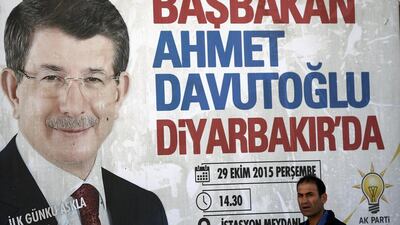Voters in Turkey will be going to the polls tomorrow with one question on their mind: is there any reason to vote differently from how they did five months ago? Sunday’s election is, in essence, a repeat of the poll held in June, which for the first time since 2002 deprived Turkey’s Justice and Development Party (AKP) of a parliamentary majority.
That result was widely interpreted as a blow to Recep Tayyip Erdogan, the Turkish president, who was counting on the AKP returning to government with a large majority so as to push through constitutional changes to concentrate power in his office.
The main reason the electorate may consider changing their vote is that in the months since June, Turkey has been embroiled in violence, including last month’s bomb attacks in Ankara.
The AKP has worked hard to present itself as the party of stability. Understandably, many voters who didn’t vote for the AKP in the last election may calculate that a single party majority would deliver, if nothing else, more clarity to the situation.
An AKP spokesperson recently suggested that if voters deliver another minority, yet another election may be held in the near future, which is a subtle and effective way to drive home the point that anything other than a majority AKP government will mean continued turmoil.
The voters who could swing the AKP from a minority to a majority position in parliament will probably come from the Nationalist Action Party (MHP). It is safe to assume that such voters, subscribing, for the most part, to a Turkish unitarist nationalism, are loath to see the Turkish government offer any concessions to Turkey’s Kurds.
As such, it is also reasonable to assume that if the AKP manages to win a majority, any commitment to the so-called “peace process” with the Kurdistan Workers’ Party (PKK) – which is already in limbo – will be terminally sundered. The clashes between Turkish security forces and the PKK have already strengthened this rationale for some voters.
The other key constituents, whose vote switching might tip the balance, are those who supported the People’s Democratic Party (HDP) in June.
The HDP support consists of the Kurdish national movement in Turkey, affiliated with, and some say led by, the PKK. However, given the more than 13 per cent of the vote the party garnered in June, it is clear that a significant part of that support was also made up of “strategic” votes, cast in the hopes of denying the AKP another majority.
Such voters will ask themselves whether or not the reasons they voted for the HDP are still valid.
Most opinion polls suggest that voters have found, on the whole, little reason to vote differently this time from how they did in June.
Surveys also suggest that the state of the economy is a key factor for voters weighing their options. Economic shakiness may sustain the electorate’s relative disillusionment with the AKP.
Syria, also, is nothing but a spoiler of the AKP’s appeal. Most Turks want nothing to do with the civil war next door that has steadily caused a deterioration in Turkey’s social stability.
The removal of Bashar Al Assad from power in Damascus used to be an essential condition of Turkey’s Syria policy. Any backtracking on that position, as seems likely as major powers shift their stance on the regime in Damascus, will only do the AKP harm.
The questions about the aftermath of Sunday’s vote remain unchanged since June’s vote: will the HDP cross the threshold of 10 per cent of the national vote required to enter parliament? If they don’t, an AKP majority is all but assured. If the HDP enters parliament, can the AKP still eke out a majority? What will Mr Erdogan do? Will an AKP majority open the door to a further concentration of presidential powers?
If the polls are right, and tomorrow’s vote is, with minor variations, a repeat of June, we already know the answers.
Caleb Lauer is a freelance journalist in Turkey

